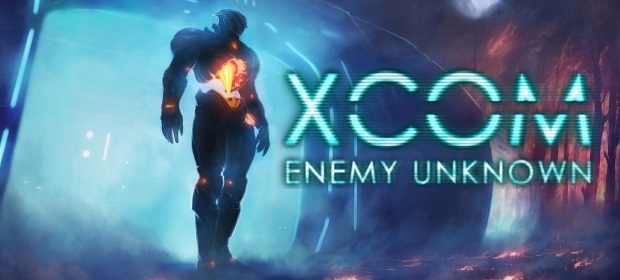I’ve never been much for tactics. My brain doesn’t work in straight lines, doesn’t allow me to analyse a situation as it is and deal with it. I’m governed by imagination, by whimsy and fancy and what-ifs. Had I been a soldier, I’d have likely been useless for anything but making up numbers and soaking up bullets.
As a result, I tend to avoid strategy games like a plague of locusts, preferring something less cerebral like your average bombastic shooter or kill-loot-level grindathon, maybe a low-brow brawler like Mortal Kombat now and then. Which is why I didn’t pay much attention to XCOM: Enemy Unknown when it was first announced. A game developed by Firaxis, they of Civilisation fame, it seemed far too clever for my liking, far too involved – and so I more or less ignored it.
It turns out that it was exactly all of those things, and yet also much, much more. A thinking man’s action game, Gears of War with a brain, Halo with a better tactical spin than Halo Wars – a game not about gung-hoism and high-fiving bro-heims, but about patience and planning as well as kicking the crap out of alien scum. I can honestly say that it’s the first strategy game I’ve ever played and truly enjoyed.

CLOSE ENCOUNTERS
The story of XCOM: Enemy Unknown is pure sci-fi action movie gold: humanity has known about the threat of alien invasion since the fifties (see The Bureau: XCOM Declassified), and has developed an international specialist task force to fight back whenever that invasion might occur. As an alien collective comprised of multiple species (think Halo’s Covenant, only less outright thuggish and not so devout) begins to lay waste to Planet Earth, XCOM leaps to the defence of everything we know.
Your role is off the ground, a nameless Commander whose tactical brilliance is all that stands between the invaders and our complete annihilation. With a global network of elite soldiers, world-class scientists and state of the art technology, your job is to defend humanity no matter the cost to XCOM itself. You are the last line, and the only prize for second place is oblivion.
Right away, the premise grabs you. Your thrust into combat with a squad full of newbies at your command, recruits straight out of regular deployment now up against actual extra-terrestrial insurgents. Your given a base of operations with barely a functioning lab and two clear facts: if you lose the support of too many global powers, the funding stops; if the funding stops, XCOM stops – and we’re all for the probing table.
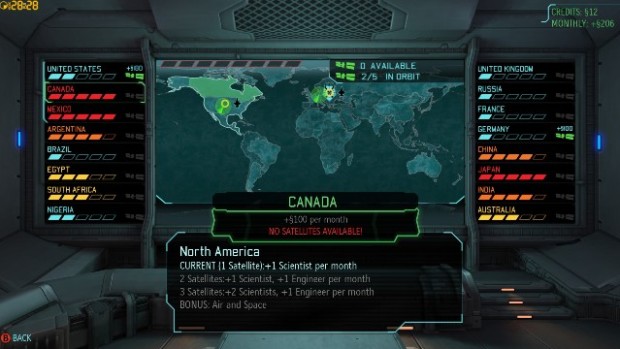
ONE NATION UNDER GOD
So how do you keep those global powers happy? You keep them alive and alien-free, that’s how. You begin by picking a base of operations, not by your cultural leanings but rather based on whatever that nation’s starting package is. For example, building your base in the USA means that all aircraft and satellites will launch faster and cost less.
Choosing the right nation for you straight off the bat is essential as it can’t be changed. Picking country because it means you earn more money every month might seem sensible, but scrambling aircraft quickly is sometimes paramount – as is being able to complete autopsies and research assignments instantaneously.
Once you have your FOB, organisation is key. Building facilities like laboratories, workshops and satellite uplinks drain power, so you need to install power stations regularly. Everything you construct takes time and money, and it’s easy to get caught out when you desperately need to launch a satellite over a panicking country but you don’t have sufficient power resources for a new uplink. 50% of XCOM is just like a top-down resource-gathering RTS, juggling dwindling consumables with necessary expenditure.
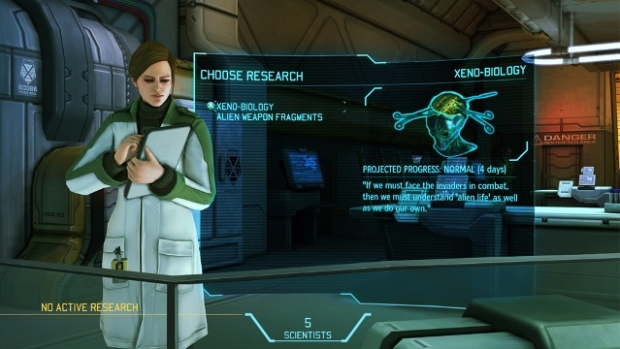
RESEARCH & DESTROY
The trick of course, is knowing what to spend your time and money on. Killing a new alien will allow you to perform an autopsy, unlocking new armour upgrades or biological enhancements for your troops, while shooting down their aircraft opens up tech advancements – but only of you have the time to complete research objectives.
Building a containment cell allows you yo capture a live specimen (if you’ve got a soldier brave enough, of course) and research your enemy even further. But everything costs days, resources and cash – all of which are finite. What XCOM excels at is making you suffer immediately for every choice that benefits you in the long run. It’s a long wait each month for you pay-out, and a lot can happen in that time. When that map starts flashing red, you’ll be forced to choose between helping one of three countries, and whoever you neglect will experience a spike in nationwide panic and unrest.
Building better defences and improved early warning systems is essential for reducing global unease, but that can be at the cost of better equipment or field training for your soldiers, and if you lose your decorated officers due to poor planning and outfitting, you’ll sit there for a while watching greenhorns get mutilated and hoping a few emerge made of tougher stuff.
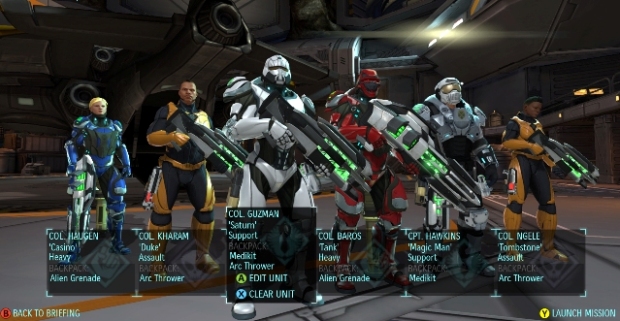
A FEW GOOD MEN
The other thing XCOM does better than almost any other game is make you care about your soldiers to a worrying degree. You choose their appearance, names, nationality, nicknames and progression path. With the Enemy Within expansion you even get to pin medals on them for valour, further increasing their stats. Watching them grow from skittish noobs to hardened veterans is incredibly satisfying, but quite devastating when your lousy planning gets one of them killed.
For all their bravery, your soldiers are only human, and all the experience and fancy armour in the world can’t save them from the actions of a shit-for-brains Commander who can’t plan a few turns ahead. A squad full of badasses is a sight to behold, whatever your set up (I tend to go for two Assault, two Snipers, a Medic and a Heavy trooper), but losing them sucks. Even getting them injured forces you to cycle them out for a few missions, which can cause serious problems.
Even in this area, XCOM’s infamous trade-offs don’t end, as you can volunteer certain squad members for specialist conditioning, potentially giving them psychic powers in Psi-Ops training, performing genetic enhancements or even going to the extreme lengths of turning them into full-on cyborg battle-mechs. You can also send them on covert missions to spy on the enemy, if you like, but one thing remains constant: whatever happens to them is on your head. XCOM does not guarantee a restful night’s sleep.
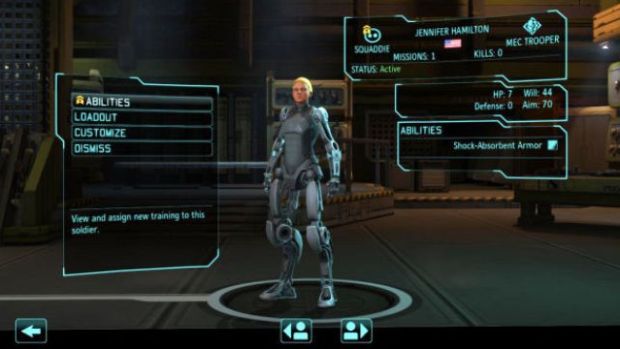
WE WILL BE WATCHING
What XCOM does guarantee is an experience almost totally unique on consoles. The Enemy Within expansion adds so much extra content – DLC, a whole new enemy, new resources and more research and development options – that it’s hard to imagine going back to plain old Enemy Unknown, but if that’s your starting point, then you’re in for a real treat.
One of the most interesting and exciting examples of strategy gaming available, XCOM comes closer than any other game to making you feel like you’re responsible for the fate of humanity and, more importantly, that you have the tools to do the job – if you’re willing to make sacrifices for the sake of victory.
It’s not a slice of touching human drama or a game boasting an affecting, thought-provoking narrative, but as an intelligent alternative to your usual run-of-the-mill sci-fi blaster, it’s peerless. If you want minute-to-minute challenge that provides those bombastic, ooh-rah thrills but also pushes that grey matter to the limit, Enemy Unknown – or indeed Enemy Within – is well worth probing.


